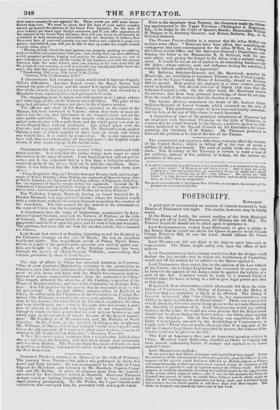Preparations for the expedition against China were continued with much
activity. It is said that the native troops were eager to enrol themselves in the army of attack. Lord Auckland had arrived at Cal- cutta; and it was expected that in a few days a definitive selection would be made of the troee destined to join the expedition. Mean- while, it was believed that the following regiments would form part of it— "Front Bengal, her Majesty's Twenty-first and Twenty-sixth, and two regi- ments of Native Infantry ; front Madras, one regiment of Queen's troops, four of Native Infantry, one r'egiment of Artillery, and one of Engineers; from Cey- lon, one regiment of Queen's troops—total, ten regiments. General Sir It. Arbuthnot, Commander-in-Chief at Ceylon, is to command the above-men- tioned force ; and Generals Oglander and Walker are to have divisions."
The Wellesley, Captain Maitland, having on board Admiral Sir J. Gordon Bremner, was expeeted at Calcutta ; where the Admiral would hold a conference with the Governor-General respecting the conduct of the expedition. The time named for the arrival of the armament on the coast of China was the beginning of May.
A detachment from the Army of Afghanistan, commanded by Lieu- tenant-Colonel Orchard, attacked the fortress of Peshoot, on the 18th of January. The operation failed, in consequence of the wetness of the gunpowder used to blow open the gates, and 65 were killed and wounded. The garrison, however, did not wait for another attack, but evacuated tile fortress.
Lord Keane had arrived at Bombay, intending to sail for England in the Palinurus steamer, on the 31 st of March. He was in excellent health and spirits. The magnificent sword of Prince Hyder Khan, which, as a part of the general prize property, was sold by public auc- tion, and bought by the officers of the Bombay column, has been, through the agency of Major-General Willshire, commanding that column, presented by them to Lord Keane. .


























 Previous page
Previous page